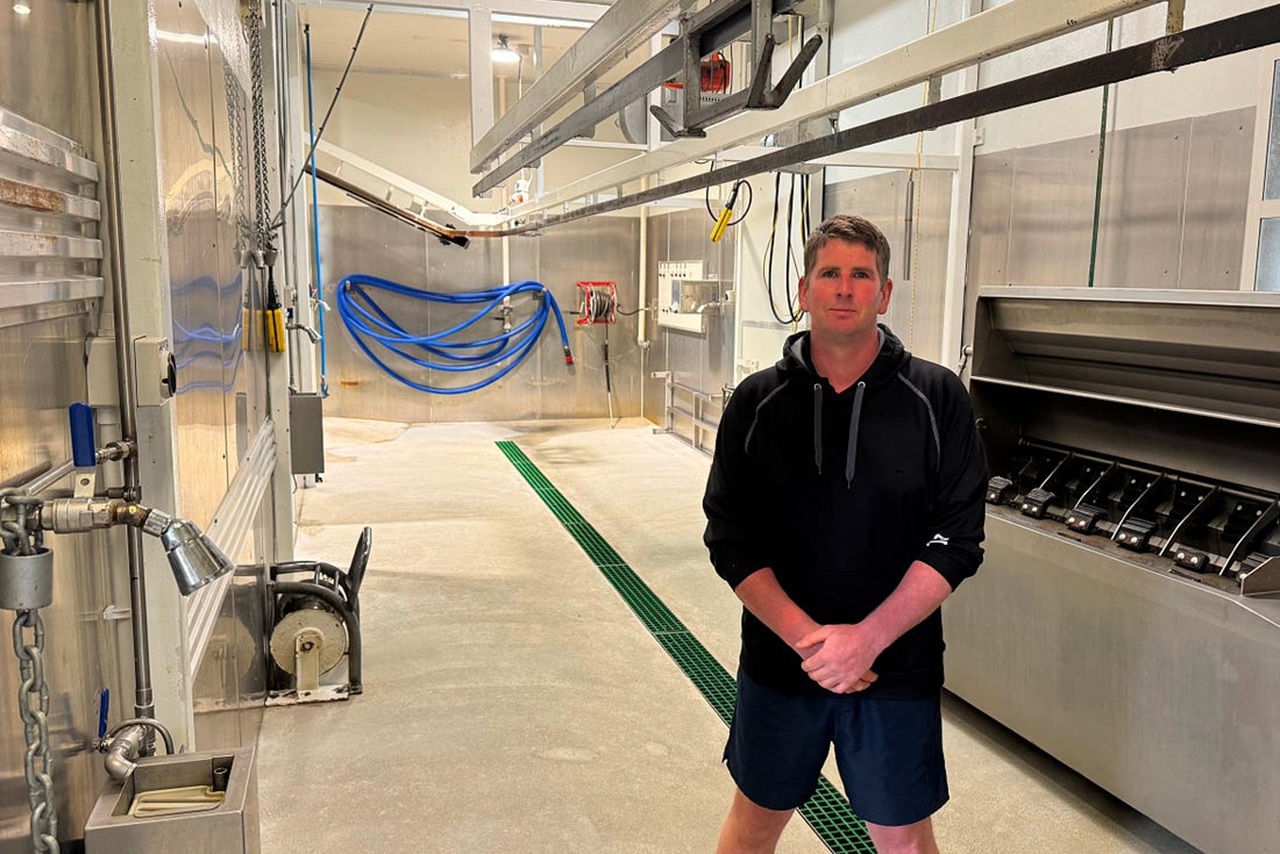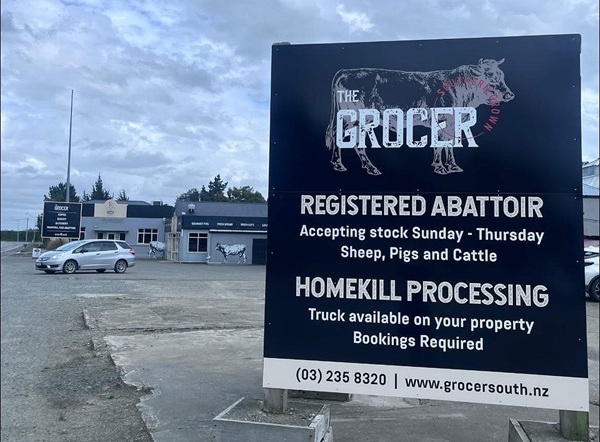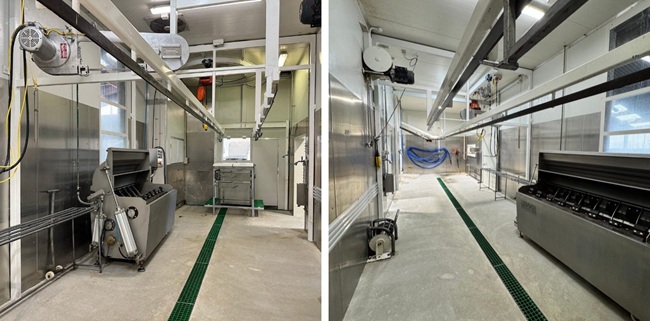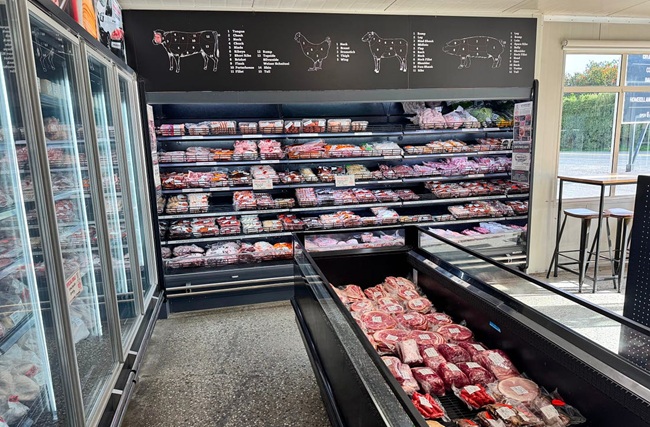Southland’s First Micro Abattoir: Closing the Loop From Field to Fridge
Murihiku Kai
23 November 2025, 9:55 PM
 Craig ‘Muscles’ Phillips, operator of The Grocer’s newly opened micro-abattoir. Photo: Supplied
Craig ‘Muscles’ Phillips, operator of The Grocer’s newly opened micro-abattoir. Photo: SuppliedAfter years of red tape, hard work, and quiet determination, Southland now has a new pathway for truly local meat.
Sometimes the biggest changes in a food system start quietly.
This one just happens to begin in Lorneville.
The local team behind The Grocer don’t sit around and hope someone else will sort a problem. They’re practical, hardworking Southlanders with a knack for seeing what’s missing, then quietly getting on with building it.
So, when small farmers began telling familiar stories about being turned away from the big meat works, or sitting on waiting lists that never seemed to budge, the two Craigs (Hamilton and Phillips) did what they do best.
They paid attention and started planning.
What began as a conversation has turned into one of the most meaningful recent shifts in Southland’s local food system.
After navigating a maze of regulations, reworking building plans, upgrading their facility, training as meat inspectors, and investing countless hours and dollars into a project many of us will never fully see.
The Grocer has just opened the South Island’s first registered micro abattoir. It’s one of the only facilities of its kind in New Zealand processing beef, sheep, pigs and goats at this scale.
It’s been years in the making. But the motivation was simple: protect the future of local meat in Southland and give small farmers the pathway they’ve been missing.

Photo: Supplied
Why it’s a great thing for Southland
The big meat processors have grown busier and more focused on export. There’s no doubt that’s great for the national economy, but as a result, it has started to squeeze out the small growers and independent farmers who produce some of the best meat in the country and support Southland’s food identity.
Some were turned away altogether. Others only just held on through long-standing relationships. But the direction was clear, space was shrinking, and local farmers were losing access to the system they relied on.
“We could see the gap opening,” Craig Phillips says.
“The big plants weren’t taking on new clients anymore, and smaller farmers literally had nowhere else to go.”
For The Grocer, the risk was personal. They rely on being able to process their own stock for their retail stores. If the door ever closed at the big plants, their ability to sell their own Southland-raised meat would evaporate overnight.
“So this was about keeping our business self-sufficient,” Craig said.
“But it was also about closing the loop, having control of the whole journey, from field to fridge.”
The result is a facility that will not only protect their own supply, but also open doors for farmers across the region.

Inside the Lorneville micro-abattoir. Photo: Supplied
What “closing the loop” actually means
For The Grocer, closing the loop means complete control over the process. From animal welfare, hygiene, inspection, handling, to the final product that reaches the shelves.
It means knowing the animal, knowing the farmer, knowing the conditions, knowing the systems, and being able to stand behind the whole journey with confidence.
For farmers, the micro abattoir creates a pathway to sell meat they’ve raised themselves. That might be direct to consumers, to a local butchery, to a restaurant, or under their own brand.
Until now, many growers simply didn’t have that option. They were too small for the big meat works and not able to sell meat legally if it was processed under the homekill model.
Craig says this facility changes that. It offers a transparent, MPI-regulated route for local meat to stay local.
The difference between homekill and a Micro Abattoir
Homekill processing is relatively limited. It’s perfectly fine for a farmer to process their own meat for personal consumption, but that meat can’t be sold. It can’t enter a butchery, restaurant, farmers market, or supermarket. It stays within the household.
A registered micro abattoir is completely different. It sits under full MPI regulation, with ante-mortem inspections (before slaughter), post-mortem inspections (after), microbiological sampling, salmonella testing, traceability systems, strict hygiene standards, and detailed documentation. That level of oversight is what allows meat to enter the retail and hospitality markets.
In a New Zealand first, The Grocer’s team have been trained and approved to carry out both ante- and post-mortem inspections in-house. That’s something usually reserved for large-scale meat works, not small regional operators.
It gives them a level of control that simply hasn’t been possible at this scale before.
“It’s business as usual, just better,” Craig says.
Navigating the grey, the hardest part of the journey
For The Grocer team, the biggest challenge hasn’t necessarily been the money, or the machinery; it’s been ‘the grey’.
“There’s a template,” Craig says, “but none of it is black and white. It’s all grey. Very grey.”
Because almost no one in New Zealand has gone through this process before, there isn’t a clear pathway. MPI could tell them the principles, the standards, the outcome, but not the exact design.
The team had to interpret requirements, design systems from scratch, and test scenarios that larger plants have entire departments to manage.
It was painstaking work for the Craigs. But it’s also what makes the end result so effective.

Photo: Supplied
How it works for farmers
Despite the complexity behind the scenes, the experience for farmers is simple.
When a farmer arrives, they’re assigned their own pen. That pen follows their animals through the entire process. Ante-mortem checks, humane slaughter, post-mortem inspection, chilling, and tagging.
Every carcass carries the farmer’s name. There’s no mixing of lines, no ambiguity, and no questions about where anything came from.
Carcasses are moved next door to the butchery for processing, or farmers have the option to collect their chilled, inspected carcasses and take them to their chosen butchery, whether that’s one of The Grocer’s own, or any other registered operator.
For many farmers, this is the first time they’ve ever had a realistic, regulated pathway to sell their own animals. It opens the door to branded meat, new customer relationships, Farmers Market stalls, restaurant supply and even something as simple as selling a quarter beast to a friend, legally.
“It opens doors that didn’t exist,” Craig says.
What it means for local eaters
For Southlanders who care about where their food comes from, this is great news.
We should expect to see more local meat processed and sold here. More local farms represented in butcheries, supermarkets, restaurants, and markets. More traceability. More transparency.
More stories tied to this place. Shorter supply chains. Fresher product.
It strengthens the regional food system.
It strengthens local identity.

The Grocer Lorneville. Photo: Supplied
A shift worth celebrating
This micro abattoir might look modest from the outside, but its impact isn’t. It fills a major gap in the Southland food system, supports small-scale farmers, strengthens local food resilience, and keeps local meat local.
It’s the kind of innovation that aligns directly with the Feeding Murihiku Good Food Roadmap and reinforces what makes our region special: passionate people, strong relationships, and a willingness to build what the community needs.
The people behind it all
A quick word on the men behind the mahi.
Craig Hamilton founded Woodlands Butchery 26 years ago and has been shaping Southland’s meat landscape ever since. He’s still innovating, still problem-solving, and still quietly leading.
Craig “Muscles” Phillips started as the clean-up boy, literally sweeping floors. Then he became an apprentice, then a butcher, and now a shareholder across three stores and the hands-on operator of The Grocer Lorneville.
It’s said, only half-jokingly, that part of the motivation for this micro abattoir was to keep him challenged.
Together, they’re a very Southland combo. Practical, hardworking, relationship-focused, and deeply committed to their community.